Praise be to God, the Lord of all existence, and blessings and peace be upon Prophet Muhammad, his family, and all his companions. Moving forward, the Scientific Council of Northern Borders University acknowledges its crucial role in overseeing the scientific endeavors of the faculty members and their research, studies, and publications. In light of this, the Council is devoted to providing all necessary resources to enhance the capabilities of the university's faculty members, motivating them to attain excellence in teaching and scientific research, and facilitating their contribution to the university and society. Our aim is to maximize this role in alignment with the university's vision, mission, and strategic objectives.
Additionally, the Council strives to identify and promote competent and exceptional Saudi professionals, encouraging their participation in conferences, sabbaticals, and training courses. We also aim to offer research opportunities, scientific articles, and the authoring and translation of local and international scientific books for Northern Border University's acceptance. These tasks are carried out in strict compliance with the governing regulations, rules, and executive provisions. We beseech God for guidance, success, and accomplishment in our endeavors.
Dr.Ahmed bin Sobeih Al-Sharari
The Chairman of the Scientific Council
